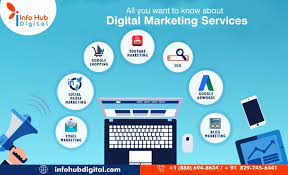The Power of Paid Online Marketing
In today’s digital age, paid online marketing has become an essential tool for businesses looking to reach their target audience and drive conversions. With the increasing competition in the online space, simply having a website or social media presence is no longer enough to stand out. Paid online marketing offers a strategic approach to boost visibility, attract potential customers, and increase sales.
Benefits of Paid Online Marketing
Targeted Reach: One of the key advantages of paid online marketing is the ability to target specific demographics, interests, and behaviours of your ideal customers. This precision targeting ensures that your ads are shown to the right audience, increasing the likelihood of engagement and conversion.
Immediate Results: Unlike organic marketing efforts that may take time to yield results, paid online marketing provides instant visibility and traffic to your website or landing pages. With pay-per-click (PPC) advertising, you only pay when users click on your ads, making it a cost-effective way to drive immediate traffic.
Measurable ROI: Paid online marketing offers detailed analytics and tracking tools that allow you to measure the performance of your campaigns in real-time. You can track key metrics such as click-through rates, conversion rates, and return on investment (ROI), enabling you to make data-driven decisions to optimise your campaigns for better results.
Types of Paid Online Marketing
Search Engine Marketing (SEM): SEM involves placing ads on search engine results pages (SERPs) to increase visibility for specific keywords related to your business. This includes both pay-per-click (PPC) ads and organic search engine optimisation (SEO) efforts.
Social Media Advertising: Platforms like Facebook, Instagram, Twitter, and LinkedIn offer robust advertising options to target users based on their demographics, interests, and online behaviour. Social media ads can help increase brand awareness, drive website traffic, and generate leads.
Conclusion
Paid online marketing is a powerful tool for businesses looking to expand their online presence and reach a wider audience. By leveraging targeted advertising strategies across various digital channels, businesses can drive meaningful engagement with potential customers and achieve their marketing objectives effectively.
Essential Insights into Paid Online Marketing: 9 Frequently Asked Questions Answered
- What is paid online marketing?
- How does paid online marketing differ from organic marketing?
- What are the benefits of using paid online marketing for businesses?
- Which platforms offer paid online marketing opportunities?
- What is pay-per-click (PPC) advertising and how does it work?
- How can businesses measure the effectiveness of their paid online marketing campaigns?
- Are there any common mistakes to avoid when implementing paid online marketing strategies?
- What budget considerations should businesses take into account when planning for paid online marketing?
- Can businesses target specific audiences with paid online marketing?
What is paid online marketing?
Paid online marketing refers to the practice of using paid advertising channels on digital platforms to promote products or services and reach a specific target audience. Unlike organic marketing efforts, which rely on unpaid methods like content marketing and search engine optimisation, paid online marketing involves investing budget in online ads to increase visibility, drive traffic, and generate leads or sales. Common forms of paid online marketing include pay-per-click (PPC) advertising on search engines and social media platforms, display advertising, sponsored content, and influencer partnerships. This strategic approach allows businesses to amplify their reach, engage with potential customers effectively, and achieve measurable results through data-driven campaigns.
How does paid online marketing differ from organic marketing?
One frequently asked question in the realm of digital marketing is how paid online marketing differs from organic marketing. Paid online marketing involves the use of paid advertising channels, such as pay-per-click (PPC) ads and sponsored content, to promote products or services and reach a targeted audience. In contrast, organic marketing focuses on building visibility and engagement through non-paid efforts like search engine optimisation (SEO), content marketing, and social media engagement. While paid online marketing offers immediate visibility and control over ad placement, organic marketing aims to establish long-term credibility, trust, and sustainable growth through valuable content and optimised strategies.
What are the benefits of using paid online marketing for businesses?
When considering the benefits of using paid online marketing for businesses, it becomes evident that this strategy offers a range of advantages that can significantly impact a company’s success. Paid online marketing enables businesses to target specific audiences with precision, ensuring that their ads reach the right people at the right time. This targeted approach not only increases the likelihood of engagement and conversions but also helps in maximising return on investment (ROI). Additionally, paid online marketing provides immediate results, allowing businesses to drive traffic to their websites or landing pages quickly and effectively. With detailed analytics and tracking tools, businesses can measure the performance of their campaigns in real-time, enabling them to make data-driven decisions for continuous optimisation. Ultimately, paid online marketing empowers businesses to enhance their visibility, attract new customers, and achieve their marketing goals in a competitive digital landscape.
Which platforms offer paid online marketing opportunities?
When considering paid online marketing opportunities, businesses have a wide range of platforms to choose from. Major platforms such as Google Ads, Facebook Ads, Instagram Ads, Twitter Ads, LinkedIn Ads, and YouTube Ads offer robust advertising solutions tailored to different target audiences and marketing objectives. Each platform provides unique targeting options, ad formats, and analytics tools to help businesses create effective paid marketing campaigns that reach their desired audience and drive results. By leveraging the diverse opportunities available on these platforms, businesses can maximise their online visibility and achieve their marketing goals efficiently.
What is pay-per-click (PPC) advertising and how does it work?
Pay-per-click (PPC) advertising is a digital marketing strategy where advertisers pay a fee each time their ad is clicked. It is a cost-effective way to drive targeted traffic to websites and increase visibility on search engine results pages (SERPs). In PPC advertising, advertisers bid on specific keywords relevant to their target audience. When users search for these keywords, the ads are displayed at the top or bottom of the SERPs. The placement of ads is determined by a combination of bid amount and ad relevance. Advertisers only pay when users click on their ads, making PPC an efficient method to attract potential customers and generate leads.
How can businesses measure the effectiveness of their paid online marketing campaigns?
Businesses can measure the effectiveness of their paid online marketing campaigns through a variety of key performance indicators (KPIs) such as click-through rates, conversion rates, return on investment (ROI), cost per acquisition (CPA), and customer lifetime value. By analysing these metrics using analytics and tracking tools, businesses can gain valuable insights into the performance of their campaigns, identify areas for improvement, and make data-driven decisions to optimise their strategies for better results. Additionally, A/B testing different ad creatives, targeting options, and landing pages can help businesses understand what resonates best with their target audience and refine their approach accordingly.
Are there any common mistakes to avoid when implementing paid online marketing strategies?
When implementing paid online marketing strategies, it is crucial to be aware of common mistakes that can hinder the success of your campaigns. One common mistake to avoid is not defining clear objectives and target audience before launching your ads. Without a clear strategy in place, you may end up targeting the wrong audience or failing to achieve your desired outcomes. Additionally, overlooking the importance of tracking and analysing campaign performance can lead to wasted budget and missed opportunities for optimisation. It is essential to continuously monitor key metrics and adjust your strategies based on data insights to maximise the effectiveness of your paid online marketing efforts.
What budget considerations should businesses take into account when planning for paid online marketing?
When planning for paid online marketing, businesses should carefully consider their budget to ensure effective and efficient campaign execution. It is crucial to determine the allocated budget for advertising costs, including ad placements, keywords, and targeting options. Businesses should also factor in additional expenses such as agency fees, creative development, and ongoing campaign optimisation. Setting clear objectives and key performance indicators (KPIs) will help businesses track the return on investment (ROI) of their marketing spend and adjust their budget allocation accordingly. By establishing a realistic budget that aligns with their goals and resources, businesses can maximise the impact of their paid online marketing efforts and achieve measurable results.
Can businesses target specific audiences with paid online marketing?
Businesses can indeed target specific audiences with paid online marketing. Through advanced targeting options available on various digital platforms, businesses can tailor their ads to reach users based on demographics, interests, behaviours, and other relevant criteria. This precision targeting ensures that ads are shown to the most relevant audience, increasing the chances of engagement and conversion. By utilising targeted advertising strategies, businesses can effectively reach their ideal customers and maximise the impact of their online marketing campaigns.




